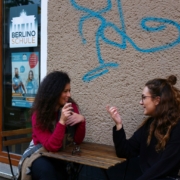Six concepts that German language can express in only one word
German as a language is well-known for the incredibly vast range of terms along with the great accuracy of its terminology, which often consists of many and difficult compound words; German-speaking people in fact are able to express structured concepts with only one word.
Using precise terms which perfectly express moods, feelings and sensations Germans and German vocabulary are famous for being both synthetic and efficient. Elsewhere we have already talked about beautiful words like Vorfreude, the joy of waiting, or Fernweh, the nostalgia of the other, of the far. This time we want to concentrate on six exceptional words – some fun, others more romantic and thoughtful – that once again show how German is a language that is also attentive to the smallest shades of the inner world of man.
Futterneid. Literally “food envy”, a feeling that we all have tried, at least once, at the restaurant (but metaphorically also in other contexts) when, after ordering a dish, we immediately realize that what our diner companion has ordered looks more appetizing and inviting.
Fremdschämen. A common feeling, experienced especially by the more empathetic ones. The verb and its noun refer to the sense of shame caused by somebody’s attitude, not ours. So when you’re brother will embarrass you, engaging himself in an awkward karaoke session while he’s drunk…well, German language has the perfect word for that situation.
Ruinenlust. This is definitely the most romantic word of the list, also from a historical point of you. The term refers to the pleasure felt while admiring ruined and crumbling old castles, relicts from the past which remind us of the ruthless flow of time.
Kummerspeck. Back to ordinary matters, this noun is related to the act of eating in order to find solace and consolation when we are worried, miserable or unfulfilled. When you’re gripped by negativity and you wish to plunder the fridge, well, think about this German word: Kummerspeck!
Sitzfleisch. Even the Germans do not let themselves be discouraged by long-term efforts, long boring activities, they rely on their perseverance to carry out large intellectual businesses. This term has something to do with the slow constancy of the study, as shown by its literal translation: “sitting meat”. In short, whether you use glue or chains you need to stay “glued” to the chair for hours and hours in order to get good results.
Frühjarsmüdigkeit. Spring is, for many, the season of renewal, of nature and spirit. But sometimes, especially when the mind fails to support these changes or the body abandons the slumbers of April, it is easy to get caught by the Frühjarsmüdigkeit, the well-known spring fatigue which pushes the lazy ones to wish for some sleep.
Translation edited by Maria Cristina Odierna


 Berlino Schule
Berlino Schule  Pixabay, CCO
Pixabay, CCO 





Leave a Reply
Want to join the discussion?Feel free to contribute!